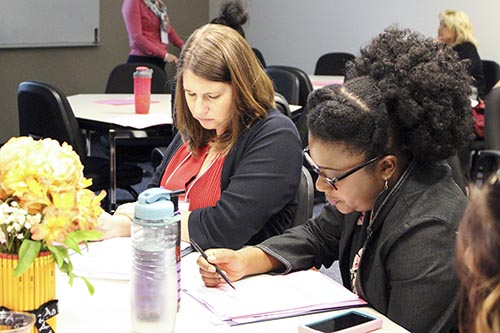Local Educators Take Action at University of Houston Workshop to Improve Early Literacy

Action Alliance brought together teachers, literacy coaches and other educators from the Houston area in partnership with the regional coalition Early Matters.
Posted March 27, 2017 – Robert McPherson, dean of the University of Houston College of Education, recalled his first job as a teacher at a high-poverty high school in Odessa, Texas, some four decades ago. Even his top students, he said, were reading on a sixth-grade level.
The importance of teaching students to read well when they’re young – and the enormity of the challenge facing teachers – has stuck with McPherson throughout his career.
“If we can get early literacy right, we can set up our students for success in high school, in college and in the workforce,” McPherson told roughly 250 educators gathered at the University of Houston on Friday for a professional development workshop.
The training, part of the college’s annual Action Alliance event, brought together teachers, literacy coaches and other educators from the Houston area in partnership with the regional coalition Early Matters. The coalition, formed in 2014 with support from the Greater Houston Partnership, includes about 70 organizations and 150 individuals committed to early education.
Research indicates a strong case for educating children from birth. Consider these statistics highlighted by Early Matters:
- Ninety percent of brain development occurs by age 5.
- Children from affluent families are exposed to 30 million more words by age 3 than children on welfare.
- Students not reading on grade level by third grade are four times more likely to drop out of school.
“Our economy is not going to be able to thrive if we don’t turn this around,” said Jim Postl, founding chairman of Early Matters and retired president and CEO of Pennzoil-Quaker State Company.
As part of the Early Matters coalition, Wanda Bamberg, superintendent of the Aldine Independent School District, said several local districts have agreed to use common assessments to measure students’ progress and have committed to sharing best practices. In addition to Aldine ISD, the partner districts are Alief, Houston, Humble, Pasadena, Spring Branch and Stafford.
“When we say Early Matters – early does matter,” added Antonio Fierro, one of the guest speakers at the Action Alliance event. Fierro is a national literacy consultant and former Texas State Teacher of the Year who grew up as an English language learner.
Fierro began and ended his remarks by reading aloud two children’s books. He shifted voices like a stage actor, modeling good instruction that had experienced educators engaged in discussing the stories and jotting down notes.
Teresa “Sesa” Edgar, clinical associate professor and coordinator of the UH College of Education’s early childhood program, said Fierro’s presentation proved the importance of reading to students multiple times a day.
“I know as a first-grade teacher sometimes I would think, ‘Oh I don’t have time to do a read aloud today,’ but this should reinforce why we should do more than one read aloud,” said Edgar, who also serves as the college’s associate dean of undergraduate studies and helped coordinate the daylong event with Early Matters executive director Veronica Chapa Gorczynski.
Sharon Vaughn, an internationally known expert in reading and learning difficulties, told the teachers at the workshop that “the people I admire most are you.” She encouraged them not to set aside specific time to teach vocabulary but to weave in playful instruction about new words “all day everyday.”
“Words are something that will make your students powerful. They are the currency that will give them that influence they need both in school now and in the future,” said Vaughn, the Manuel J. Justiz Endowed Chair in Education and executive director of the Meadows Center for Preventing Educational Risk, an organized research unit at the University of Texas at Austin.
Vaughn, the author of more than 35 books and 250 research articles, said she used to struggle with how to teach reading comprehension. However, she told the teachers to focus instead on the meaning of words, building background knowledge and making reading exciting for their students.
“And then guess what?” she said. “They understand what they read.”
Between training sessions, Griselda Balbuena, a bilingual pre-kindergarten teacher in Spring Branch ISD, described the Action Alliance event as “very inspirational.”
She said she was reminded to use academic language not only with her colleagues but with her young students as well.
“With our pre-K students, we can tend to talk down to them,” she said. “This has made me more reflective of my practice.”
–By Ericka Mellon